Life
Is Junk Food Shrinking Your Brain?

Whether you have a sweet tooth or a soft spot for all things salty, it's hard to kick the urge for some junk food — it's designed to taste ultra-rewarding in the moment. But disturbing new evidence suggests that junk food literally shrinks your brain, so you might want to think again before you indulge. This brain shrinking is associated with impaired memory, but when you're old you're going to want to hang on to as much of your memory as you can.
Researchers from Deakin University and the Australian National University (ANU) studied the brains of 155 older Australians who had participated in a data collection initiative in recent years, including a nutritional profile. Their diets were characterized as more or less "Western" (including salty processed foods and sweet drinks) or "prudent" (including more fruits, vegetables, and fish). These people also received two magnetic resonance imaging scans, four years apart.
As reported in the journal BMC Medicine, the prudent diet was associated with a larger hippocampus as compared to the Western diet. Importantly, this correlation persisted even when researchers controlled for "age, gender, education, labour-force status, depressive symptoms and medication, physical activity, smoking, hypertension and diabetes," suggesting that it indicates a real relationship between diet and hippocampus volume.
Your hippocampus is important due to its huge role in healthy memory functioning. In the very most extreme case, people whose hippocampus has been removed are doomed to lives of inability to store or retain new memories. This hippocampus and diet connection may at least partially explain the rise of Alzheimer's disease in developed countries.
Of course, reports like this are always scary to read at the time, but they're difficult to translate into action. Personally, I just ate a couple of trans fat-laden, sugar-coated cinnamon rolls — after I started writing this, even. Did my brain shrink since then? Probably not. As the researchers point out, the challenge of diet and health is two-fold. People need to include healthy foods that have protective benefits (antioxidants, omega 3s) and also to exclude unhealthy foods. Sometimes these goals compete, and overeating is bad too so you can't just stuff a salad in on top of that fast food and call it a day.
The subjects in the study had been practicing their eating habits for decades and decades to get where they were, so the most important thing is to find a diet that's sustainable. If you are going to eat something unhealthy, at least make sure it tastes really good for crying out loud, and make sure that most of your meals are nutrient-dense to compensate. The cumulative benefits of a mostly really healthy diet with occasional lapses are probably better than the effects of a mediocre diet day in and day out, and the former is more enjoyable too.
Image: Syda Productions/Fotolia; Giphy